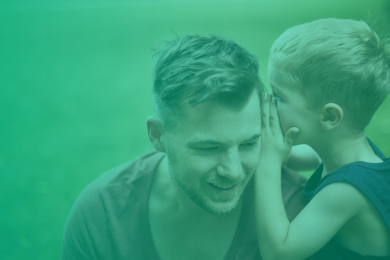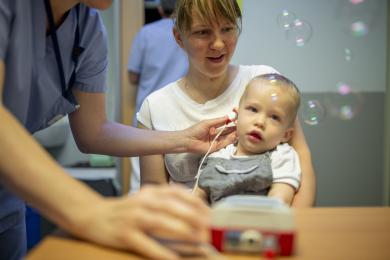Meet Manon Altazin, a singular woman who has something to teach us. She went through her deaf condition to became a pilot.
When Manon Altazin talks about her great passion in life, flying, her face lights up. Up to the age of 14, this young trainee pilot did high-level gymnastics. “It was my passion and I couldn’t bear having to stop.” What’s different about Manon is that she was born profoundly deaf. “There was too much impact on the inner part of my implant so I couldn’t continue. I had to do something else as an escape.”
Thanks to someone her father knew, Manon first went up in a plane at the age of 15. Since then, she has never come down. “Flying saved me. Being in the air means being free.”
GROWING UP DESPITE DEAFNESS
From her early childhood, Manon’s parents tried to understand why she was behaving differently to other babies. “When I was little, I did ‘hearing’ tests with toys, but they had lights or vibrations that made me react, so they weren’t very useful…” That explains why, against all expectations, an ear, nose and throat doctor announced to Manon’s parents… that she could hear! Not satisfied with these results, they continued their research and finally learned from a Parisian ENT that Manon was profoundly deaf, plunged into a world of silence.
Fitted with a hearing aid a few weeks later, Manon started speech therapy and was placed in special classes up to the Baccalauréat.
“I had lots of problems with my cochlear implant,” she says. “Having received her first implant at the age of eight, Manon had a second operation after a problem with the internal part. In the meantime, Manon lost the little remaining hearing in her left ear after poor medical care, which left her in total silence at the age of 12. At 15, the same problem cropped up, along with another operation. “Since then, it’s all been fine!” she says, laughing.
At school, she had a deaf interpreter. At high school, the organization was better suited: “We were in classes of four to seven deaf and oral-deaf students. We were able to take our Bac in four years instead of three, so we could learn by lip reading.”
Then things were tough for a while. “I was the only deaf person in my preparatory class and my physical therapy studies!” she says with a smile. “It was all too fast and inaccessible. The level was very high and the jargon scientific. But I got through it all the same!”
For two years now, Manon has been working in a practice near Paris. “I have excellent, natural relations with my patients. It’s very rare that I have to explain how to communicate with me. Mostly I don’t tell people I’m deaf. My voice and my visible implant give them a clue.”
A PASSION WITH MANY OBSTACLES
Manon’s passion for aviation developed at the same time, despite many obstacles that she successfully overcame. “It was complicated all the same. The regulation says that a deaf person cannot fly a plane, because of the problems communicating by radio.” As a result, Manon was suspended for two years and had to take medical tests. “It was absurd: they put me in a soundproof cabin and asked me to repeat what I heard in headphones. I told them there was no point, and they kept coming to ask me why I wasn’t saying anything.
Finally, Manon requested a waiver and can now fly solo in uncontrolled airspace or with a pilot in controlled airspace. “The motto in aviation is: ‘see and avoid!’ so I’m at an advantage there!” I make sure my deafness doesn’t stop me from doing anything,” she explains. It’s worth pointing out that Manon has been well cared for since her birth. “Your entourage is very important. When I see my parents and my grandparents, what they’ve done for me… I admire them. They’ve had to really battle for everything, facing loads of rejection all the time. I wasn’t even allowed to eat in the canteen for so-called safety reasons!”
“YOU’RE DEAF AND YOU WANT TO BE A PHYSICAL THERAPIST?!”
When she’s asked what’s lacking for deaf people in France, Manon doesn’t take long to reply. “There needs to be more open-mindedness, so that hearing people listen to our needs, especially in terms of education and access to information. Why should you have to go far from home to receive an education when you’re deaf? Even in a physical therapy school in France, people looked at me strangely: “You’re deaf and you want to be a physical therapist?!” Fortunately, Belgium allowed me to become one!
Thanks to the challenges she’s faced in life, Manon has a smile that lights up her face when she talks about the new projects she would like to take on. “I’m going to cycle across France with my dad in homage to my younger brother, who’s also deaf but who hasn’t had much luck in his life and hasn’t received any help from society. Manon wants to make the most of this trip to raise drivers’ awareness of cyclists, especially deaf ones, and road safety. “I’d like to finish my pilot training, finish my first course in aerobatics and redo “Rêves de Gosses” (“Kid’s Dreams,” an aerial Tour de France) with two paraplegic pilot friends and a man with capillary deficiency!”
Rêves de Gosses is an adventure for “ordinary and extraordinary children,” who learn to discover and accept their differences. These children work on an educational project six months ahead of their first flight, which is organized free of charge for them. Last year, Fondation Pour l’Audition helped sponsor this operation.
Manon has a full life in the air and on firm ground. With her family having made a strong commitment to her since her earliest years, she seems determined to do the same for the people around her, to everyone’s delight.”


